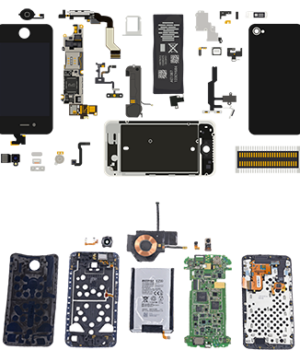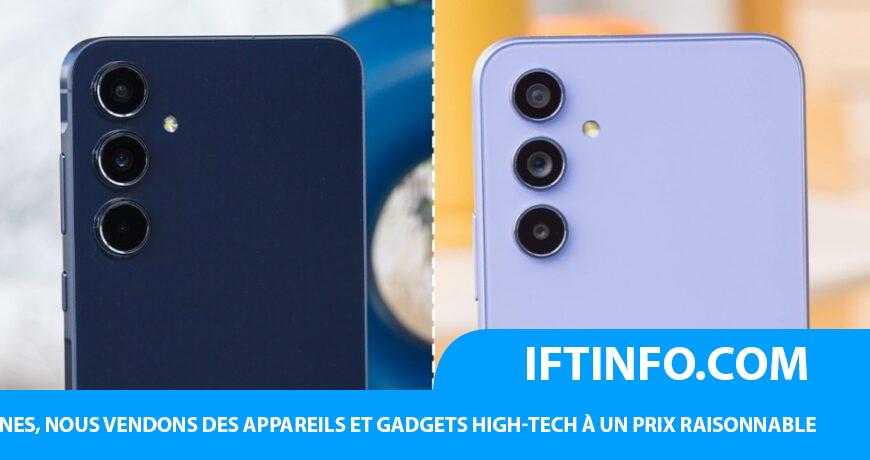IFTINFO – Samsung Galaxy A55 vs. Samsung Galaxy A54 laissez un commentaire
[ad_1]
Samsung really tricked out this year’s A5X model and arguably got it closer to the Galaxy S line than ever. The most notable upgrade this year has to be the overall build quality. The A55 includes an aluminum frame, Gorilla Glass Victus+ on the front and another Gorilla Glass sheet on the back. The new Exynos 1480 chipset also offers a nice little uptick in both performance and efficiency compared to last year’s model. The Galaxy A55 has also grown notably compared to the A54 and now rocks a bigger 6.6-inch display inside a proportionally larger body.
That being said, last year’s Galaxy A54 has depreciated nicely and, at its attractive price point, still offers much of the same experience as the Galaxy A55. Sure, the build isn’t quite as premium, but you still get IP67 ingress protection and two sheets of Gorilla Glass. All the other potentially alluring additional features are shared between the two devices as well, like the stereo speaker setup and microSD card slot for storage expansion. And the two phones have very similar camera setups.
Table of Contents:
For starters, you can compare the complete specs sheets or directly continue with our editor’s assessment in the following text.
Size comparison
As we mentioned, the Galaxy A55 is the slightly bigger device out of the two. Samsung decided to stretch the display diagonal from 6.4 inches to 6.6 inches, and the device body grew alongside that as well. Even so, the Galaxy A55 remains pretty pocketable and fairly easy to handle, partly thanks to its thinner display bezels. The A55 boasts a screen-to-body ratio of around 85.8%, while the A54 sits somewhere around 82.9% by our calculations.
That said, the bezel difference isn’t really noticeable unless you hold the two devices side by side. Both look good enough for midrangers from the front with reasonably small selfie camera punch holes, identical under-display fingerprint readers and pretty much no other visible sensors or I/O on the front. Both phones are pretty much flat on both sides.
However, there are still notable differences in design language across the two generations. The A54 is much rounder, with gently sloping corners and a middle frame tapering at the phone’s front and back. The A55 is rocking Samsung’s new design language with a flatter and much sharper middle frame that includes an elevated portion for the side buttons to sit on. Samsung also gave a nod to the new aluminum building material of the frame by giving in a brushed finish.
Speaking of materials, the Galaxy A55 has a more premium build than its A54 predecessor. This includes the aluminum frame we already mentioned and Gorilla Glass Victus+ on the front. Some undisclosed type of Corning glass also covers the back side of the A55. Meanwhile, the A54 still has excellent, but not quite as durable, Gorilla Glass 5 on both its front and back, with a plastic middle frame.
The heavier metal frame and larger display are the reasons why the Galaxy A55 is heavier than its predecessor. Not by a lot, mind you. Samsung managed to preserve the same body thickness across both generations, which makes sense since the battery has remained the same at 5,000 mAh.
Samsung arguably went with slightly more noted-down color options for the A55. These include Iceblue, Lilac, Navy and Lemon. The A54 has an arguably more traditional color selection, including options like Graphite and White, as well as the notably more vibrant Lime and Violet.
As we said, the A55 and A54 are very similar in terms of controls and layout. Both have a stereo speaker setup and optical under-display fingerprint readers. NFC is market-dependent for both models. Both also have expandable storage via a microSD slot, shared with the second nano-SIM slot. Neither model has a 3.5mm audio jack or an onboard FM radio receiver. It is also worth noting that, unfortunately, both also have virtual proximity sensors.
Display comparison
As mentioned, the Galaxy A55 has a slightly bigger display than its A54 predecessor. Other than that, the two panels are quite similar in terms of specs and performance. You get a 120Hz refresh rate with identical automatic refresh rate handling. Resolution is also identical across the two phones at 1080 x 2340 pixels with the same 19.5:9 aspect ratio.
Both phones have HDR10+ certification and support. The maximum refresh rate is also quite similar, although we did manage to get a few nits more out of the Galaxy A55 in our testing. You can expect to get around 1,000 nits in auto mode, which is respectable and perfectly usable outdoors, though far from industry-leading. However, it would be unfair not to note that some cheaper phones beat Samsung at its own game and offer more than 1,400 nits of brightness.
Battery life
The Galaxy A55 and A54 both have a 5,000 mAh battery on board. However, the Exynos 1480 chipset inside the Galaxy A55 is seemingly more efficient than the Exynos 1380. This, alongside presumably some software refinement (Galaxy A54 was tested on Android 13 and One UI 5.1, whereas the Galaxy A55 was tested with Android 14 and One UI 6.1), allows the Galaxy A55 to score a notably higher Active Use Score in our standardized testing.
The difference is frankly not massive, but it is nearly across the board in all tests except for gaming. So, the Galaxy A55 technically has a small but notable edge in terms of battery endurance.
Charging speed
Many of Samsung’s current models support the same 25W Super Fast Charge Samsung charging standard. However, in our testing, we noticed significant differences in actual charging speed between the A55 and the A35 despite the same 25W charging rating.
This is not the case with the Galaxy A55 and A54. The two phones charge at the exact same rate. It’s far from industry-leading, and you can definitely get faster charging from competitors in this price range. However, for the purposes of this comparison, the two phones are identical.
Speaker test
The Galaxy A55 and A54 have similar hybrid stereo speaker setups with one dedicated bottom-firing speaker and the amplified earpiece acting like the second channel.
Despite having pretty similar speaker setups, the A55 has a clear edge over the A54 in this department. Quality-wise, the speakers leave a bit more to be desired from the high-frequency sounds at maximum or near-maximum volume, but the bass is prominent and the vocals sound way cleaner than before. In fact, the A54 sounds muffled compared to the A55.
The A55 is also technically a bit louder than the A54, managing a VERY GOOD score in our testing compared to GOOD on the A54.
Performance
One of the upgrades introduced to the Galaxy A55 this year is Samsung’s newer Exynos 1480 chipset. It is a 4nm part from the beginning of 2024 that replaces the Exynos 1380 inside the A54 – a 5nm part from the beginning of 2023.
Both chipsets use a four plus four CPU configuration with four Cortex-A78 cores and four Cortex-A55 ones. The difference is that the Cortex-A78 cores inside the Exynos 1480 have a noticeably higher max clock speed of 2.75 GHz compared to 2.4 GHz on the Exynos 1380. This does give the 1480 an edge in CPU performance.
The new RDNA 2-based Xclipse 530 GPU inside the Exynos 1480 is a much bigger upgrade over the Mali G68 MP5 inside the Exynos 1380. This means that the Galaxy A55 performs better in GPU tests than the A54.
The Galaxy A54 is usually offered in a 6GB/128GB base version. The full list of A54 configs includes 128GB 4GB RAM, 128GB 6GB RAM, 128GB 8GB RAM, 256GB 6GB RAM, and 256GB 8GB RAM.
The Galaxy A55 comes with 8GB of RAM out of the gate, even in the base 128GB storage version. Its full list of variants includes 128GB 8GB RAM, 256GB 8GB RAM, and 256GB 12GB RAM.
As a reminder, we tested the entry-level 8GB/128GB Galaxy A55 and the middle-level 8GB/128GB A54 unit, making them identical. As far as we can tell from the testing, both phones use UFS 2.1 storage chips.
Looking at benchmark numbers, it is clear that the Galaxy A55 offers a notable increase in performance over the Galaxy A54. It is not massive, but it is definitely there.
The newer Exynos 1480 chipset offers connectivity options similar to its Exynos 1380 predecessor. This includes Wi-Fi 6 support inside the A55 and A54. Although the new chipset technically supports Wi-Fi 6E, that doesn’t seem to be enabled for the A55. Bluetooth support is identical at version 5.3 with LE support. Both phones also have USB 2.0 data connection without display output but with OTG/Host support.
This is a good place to mention software and support. Both the A55 and A54 come with the same promise of four years of major OS updates and five years of security patches. That’s a big commitment on Samsung’s behalf, and it’s more than most competitors have to offer on their midrangers. While the two phones have the same support period, the A54 is already a year into said cycle, which might be worth considering.
Camera comparison
The Galaxy A55 and A54 have very similar camera setups at first glance. Both phones have an OIS-enabled 50MP main camera with a 1/1.56″ sensor and 1.0µm pixels, sitting behind an f/1.8 lens. However, the two sensors are not identical. The A55 uses a Sony IMX906, whereas the A54 uses either Samsung’s own GN5 or the Sony IMX766.
The two ultrawide cams look quite similar at first glance as well, but they also use different sensors, at least as far as we can tell. The same appears to be true about the 32MP selfie cameras as well.
Image quality
Looking at the main cameras on both phones, the photos look quite comparable in terms of detail. Dynamic range and contrast are far from perfect on either phone, but they are also quite comparable.
Samsung Galaxy A55: 12.5MP main camera samples
Samsung Galaxy A54: 12.5MP main camera samples
The A55 tends to have slightly more laid-back and relaxed processing, so to speak. Its color rendition is less saturated, and you get less sharpening. It’s not like the Galaxy A54 is overly aggressive in its approach, but there is a noticeable difference.
The two ultrawide cameras are also quite comparable in quality, though, looking at the samples, we do have to give the A54 a slight edge. It seems to offer a bit more detail with less sharpening artifacts.
Samsung Galaxy A55: 12MP ultrawide camera samples
Samsung Galaxy A54: 12MP ultrawide camera samples
By contrast, the Galaxy A55 captures slightly noisier photos with more aggressive sharpening.
We honestly can’t find any meaningful quality difference between the selfie cameras of the A55 and A54. Both phones do a great job of capturing selfies. Faces come out looking sharp and detailed despite the lack of any autofocus. Skin tones look great, too.
Samsung Galaxy A55: 12MP main camera samples
Samsung Galaxy A54: 12MP main camera samples
Both phones capture very competent low-light photos with their respective main cameras. Detail is great, even in the shadows. Highlights are well developed, too and light sources are handled very competently.
Samsung Galaxy A55 low-light: 0.6x • 1x • 2x
Samsung Galaxy A54 low-light: 0.6x • 1x • 2x
If we had to choose, perhaps we would give the A54 a slight edge in detail. The ultrawide cameras do reasonably well, too, but are nothing to phone home about. Again, it is quite comparable in overall quality.
Video quality
Both the Galaxy A55 and A54 can do up to 4K video capture on the main cameras, ultrawides and selfie cameras. You get the same AVC/h.264 video stream at around 50 Mbps on both phones with stereo AAC audio inside an MP4 container. There is also the option to capture in HEVC/h.265 and save on some storage. The Galaxy A54 used to only have video stabilization at 1080p resolution, but Samsung has introduced 4K@30fps video stabilization to the A54 as well.
4K footage from the main cameras of both phones is comparable in terms of overall quality. There is plenty of detail, although we would say that the A54 has the edge in this department, producing noticeably cleaner and sharper videos.
Samsung Galaxy A55 video samples
Samsung Galaxy A54 video samples
Dynamic range is also comparable between the two phones, though the A54 seems to have a slight edge. Colors are very similar, though the A55 seems to have a slightly more saturated palette.
The Galaxy A54 tends to sharpen footage from its ultrawide camera a bit more, though, yet again, there isn’t a major difference in overall quality between the A55 and A54.
As far as low-light videos go, yet again, the difference is small, but once again, we have to say that the A54 has a slight edge in detail.
Verdict
Choosing between the Galaxy A55 and A54 is not particularly easy. First off, there is always the price, where the A54 is a clear winner.
You might also want to consider size. The A55 has definitely grown. It’s not by a lot, but still, the A54 is the more compact and “pocketable” device out of the two.
If neither of the above is enough to sway you towards the A54, the Galaxy A55 does everything else as well or even better than the A54. It has a larger screen. It also has a distinctly more premium build with an aluminum frame and Gorilla Glass Victus+ on the front. It also has a clear edge in overall performance thanks to the new Exynos 1480 chipset. It is also worth noting that it comes with 8GB of RAM as a minimum, compared to the 6GB you will typically find the A54 rocking, making it more futureproof. It’s also the newer model so it still has full four major OS updates and five years of security patches ahead of it. The Galaxy A54 is already one year into its otherwise identical support cycle.
The Galaxy A55 also has notably nicer speakers and a slightly, but still measurably longer battery life.
At the end of the day, the Galaxy A55 and A54 are expectedly very similar devices. Both offer nice quality-of-life features like the IP67 rating, HDR10+ support and nice stereo speakers, to name a few. You won’t go wrong with either.
Get the Samsung Galaxy A55 for:
The more premium build.
The larger display.
The slightly longer battery life.
The nicer speakers.
The better performance.
It’s newer and has longer software support remaining.
Get the Samsung Galaxy A54 for:
The cheaper price.
The smaller and lighter body.
The slightly better detail on the main camera.
[ad_2]








